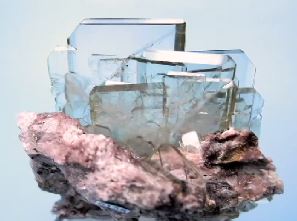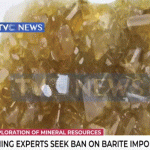 Mining experts in Nigeria are seeking a ban on the importation of Barite, one of the many mineral resources in Nigeria to enhance its exploration and assist government in economic diversification.
Mining experts in Nigeria are seeking a ban on the importation of Barite, one of the many mineral resources in Nigeria to enhance its exploration and assist government in economic diversification.
Correspondent Joke Adisa reports that Barite is a mineral consisting of barium sulfate, typically occurring as colorless prismatic crystals or thin white flakes.
It is used as a pigment in paints, as a weighted filler for paper, cloth or rubber, as a weighting agent for drilling muds and for petroleum well drilling among other uses.
Nigeria is one of the African countries that boasts of vast deposits of the mineral but these practitioners are concerned that its importation is hampering the effective exploration and economic gains of the product. They crave for government support.
Indeed, between 2003 and 2014, Nigeria banned the importation of barite in an effort to stimulate development and the use of domestic barite resources. But agitations from oil companies led to the lifting of the ban in 2014 on the ground that local production struggled to meet API specifications and desired volumes.
Now, government said it is ready to put in place enabling laws to guarantee the operations of local miners.
The practitioners are quick to warn that continued importation of barite will bleed the country’s economy and guarantee loss of the few available jobs. The government recently launched its Economic Recovery and Growth Plan, and mining is one of its main targets.
 Mining experts in Nigeria are seeking a ban on the importation of Barite, one of the many mineral resources in Nigeria to enhance its exploration and assist government in economic diversification.
Mining experts in Nigeria are seeking a ban on the importation of Barite, one of the many mineral resources in Nigeria to enhance its exploration and assist government in economic diversification.
Correspondent Joke Adisa reports that Barite is a mineral consisting of barium sulfate, typically occurring as colorless prismatic crystals or thin white flakes.
It is used as a pigment in paints, as a weighted filler for paper, cloth or rubber, as a weighting agent for drilling muds and for petroleum well drilling among other uses.
Nigeria is one of the African countries that boasts of vast deposits of the mineral but these practitioners are concerned that its importation is hampering the effective exploration and economic gains of the product. They crave for government support.
Indeed, between 2003 and 2014, Nigeria banned the importation of barite in an effort to stimulate development and the use of domestic barite resources. But agitations from oil companies led to the lifting of the ban in 2014 on the ground that local production struggled to meet API specifications and desired volumes.
Now, government said it is ready to put in place enabling laws to guarantee the operations of local miners.
The practitioners are quick to warn that continued importation of barite will bleed the country’s economy and guarantee loss of the few available jobs. The government recently launched its Economic Recovery and Growth Plan, and mining is one of its main targets.
 Mining experts in Nigeria are seeking a ban on the importation of Barite, one of the many mineral resources in Nigeria to enhance its exploration and assist government in economic diversification.
Mining experts in Nigeria are seeking a ban on the importation of Barite, one of the many mineral resources in Nigeria to enhance its exploration and assist government in economic diversification.
Correspondent Joke Adisa reports that Barite is a mineral consisting of barium sulfate, typically occurring as colorless prismatic crystals or thin white flakes.
It is used as a pigment in paints, as a weighted filler for paper, cloth or rubber, as a weighting agent for drilling muds and for petroleum well drilling among other uses.
Nigeria is one of the African countries that boasts of vast deposits of the mineral but these practitioners are concerned that its importation is hampering the effective exploration and economic gains of the product. They crave for government support.
Indeed, between 2003 and 2014, Nigeria banned the importation of barite in an effort to stimulate development and the use of domestic barite resources. But agitations from oil companies led to the lifting of the ban in 2014 on the ground that local production struggled to meet API specifications and desired volumes.
Now, government said it is ready to put in place enabling laws to guarantee the operations of local miners.
The practitioners are quick to warn that continued importation of barite will bleed the country’s economy and guarantee loss of the few available jobs. The government recently launched its Economic Recovery and Growth Plan, and mining is one of its main targets.
 Mining experts in Nigeria are seeking a ban on the importation of Barite, one of the many mineral resources in Nigeria to enhance its exploration and assist government in economic diversification.
Mining experts in Nigeria are seeking a ban on the importation of Barite, one of the many mineral resources in Nigeria to enhance its exploration and assist government in economic diversification.
Correspondent Joke Adisa reports that Barite is a mineral consisting of barium sulfate, typically occurring as colorless prismatic crystals or thin white flakes.
It is used as a pigment in paints, as a weighted filler for paper, cloth or rubber, as a weighting agent for drilling muds and for petroleum well drilling among other uses.
Nigeria is one of the African countries that boasts of vast deposits of the mineral but these practitioners are concerned that its importation is hampering the effective exploration and economic gains of the product. They crave for government support.
Indeed, between 2003 and 2014, Nigeria banned the importation of barite in an effort to stimulate development and the use of domestic barite resources. But agitations from oil companies led to the lifting of the ban in 2014 on the ground that local production struggled to meet API specifications and desired volumes.
Now, government said it is ready to put in place enabling laws to guarantee the operations of local miners.
The practitioners are quick to warn that continued importation of barite will bleed the country’s economy and guarantee loss of the few available jobs. The government recently launched its Economic Recovery and Growth Plan, and mining is one of its main targets.
 Mining experts in Nigeria are seeking a ban on the importation of Barite, one of the many mineral resources in Nigeria to enhance its exploration and assist government in economic diversification.
Mining experts in Nigeria are seeking a ban on the importation of Barite, one of the many mineral resources in Nigeria to enhance its exploration and assist government in economic diversification.
Correspondent Joke Adisa reports that Barite is a mineral consisting of barium sulfate, typically occurring as colorless prismatic crystals or thin white flakes.
It is used as a pigment in paints, as a weighted filler for paper, cloth or rubber, as a weighting agent for drilling muds and for petroleum well drilling among other uses.
Nigeria is one of the African countries that boasts of vast deposits of the mineral but these practitioners are concerned that its importation is hampering the effective exploration and economic gains of the product. They crave for government support.
Indeed, between 2003 and 2014, Nigeria banned the importation of barite in an effort to stimulate development and the use of domestic barite resources. But agitations from oil companies led to the lifting of the ban in 2014 on the ground that local production struggled to meet API specifications and desired volumes.
Now, government said it is ready to put in place enabling laws to guarantee the operations of local miners.
The practitioners are quick to warn that continued importation of barite will bleed the country’s economy and guarantee loss of the few available jobs. The government recently launched its Economic Recovery and Growth Plan, and mining is one of its main targets.
 Mining experts in Nigeria are seeking a ban on the importation of Barite, one of the many mineral resources in Nigeria to enhance its exploration and assist government in economic diversification.
Mining experts in Nigeria are seeking a ban on the importation of Barite, one of the many mineral resources in Nigeria to enhance its exploration and assist government in economic diversification.
Correspondent Joke Adisa reports that Barite is a mineral consisting of barium sulfate, typically occurring as colorless prismatic crystals or thin white flakes.
It is used as a pigment in paints, as a weighted filler for paper, cloth or rubber, as a weighting agent for drilling muds and for petroleum well drilling among other uses.
Nigeria is one of the African countries that boasts of vast deposits of the mineral but these practitioners are concerned that its importation is hampering the effective exploration and economic gains of the product. They crave for government support.
Indeed, between 2003 and 2014, Nigeria banned the importation of barite in an effort to stimulate development and the use of domestic barite resources. But agitations from oil companies led to the lifting of the ban in 2014 on the ground that local production struggled to meet API specifications and desired volumes.
Now, government said it is ready to put in place enabling laws to guarantee the operations of local miners.
The practitioners are quick to warn that continued importation of barite will bleed the country’s economy and guarantee loss of the few available jobs. The government recently launched its Economic Recovery and Growth Plan, and mining is one of its main targets.
 Mining experts in Nigeria are seeking a ban on the importation of Barite, one of the many mineral resources in Nigeria to enhance its exploration and assist government in economic diversification.
Mining experts in Nigeria are seeking a ban on the importation of Barite, one of the many mineral resources in Nigeria to enhance its exploration and assist government in economic diversification.
Correspondent Joke Adisa reports that Barite is a mineral consisting of barium sulfate, typically occurring as colorless prismatic crystals or thin white flakes.
It is used as a pigment in paints, as a weighted filler for paper, cloth or rubber, as a weighting agent for drilling muds and for petroleum well drilling among other uses.
Nigeria is one of the African countries that boasts of vast deposits of the mineral but these practitioners are concerned that its importation is hampering the effective exploration and economic gains of the product. They crave for government support.
Indeed, between 2003 and 2014, Nigeria banned the importation of barite in an effort to stimulate development and the use of domestic barite resources. But agitations from oil companies led to the lifting of the ban in 2014 on the ground that local production struggled to meet API specifications and desired volumes.
Now, government said it is ready to put in place enabling laws to guarantee the operations of local miners.
The practitioners are quick to warn that continued importation of barite will bleed the country’s economy and guarantee loss of the few available jobs. The government recently launched its Economic Recovery and Growth Plan, and mining is one of its main targets.
 Mining experts in Nigeria are seeking a ban on the importation of Barite, one of the many mineral resources in Nigeria to enhance its exploration and assist government in economic diversification.
Mining experts in Nigeria are seeking a ban on the importation of Barite, one of the many mineral resources in Nigeria to enhance its exploration and assist government in economic diversification.
Correspondent Joke Adisa reports that Barite is a mineral consisting of barium sulfate, typically occurring as colorless prismatic crystals or thin white flakes.
It is used as a pigment in paints, as a weighted filler for paper, cloth or rubber, as a weighting agent for drilling muds and for petroleum well drilling among other uses.
Nigeria is one of the African countries that boasts of vast deposits of the mineral but these practitioners are concerned that its importation is hampering the effective exploration and economic gains of the product. They crave for government support.
Indeed, between 2003 and 2014, Nigeria banned the importation of barite in an effort to stimulate development and the use of domestic barite resources. But agitations from oil companies led to the lifting of the ban in 2014 on the ground that local production struggled to meet API specifications and desired volumes.
Now, government said it is ready to put in place enabling laws to guarantee the operations of local miners.
The practitioners are quick to warn that continued importation of barite will bleed the country’s economy and guarantee loss of the few available jobs. The government recently launched its Economic Recovery and Growth Plan, and mining is one of its main targets.














